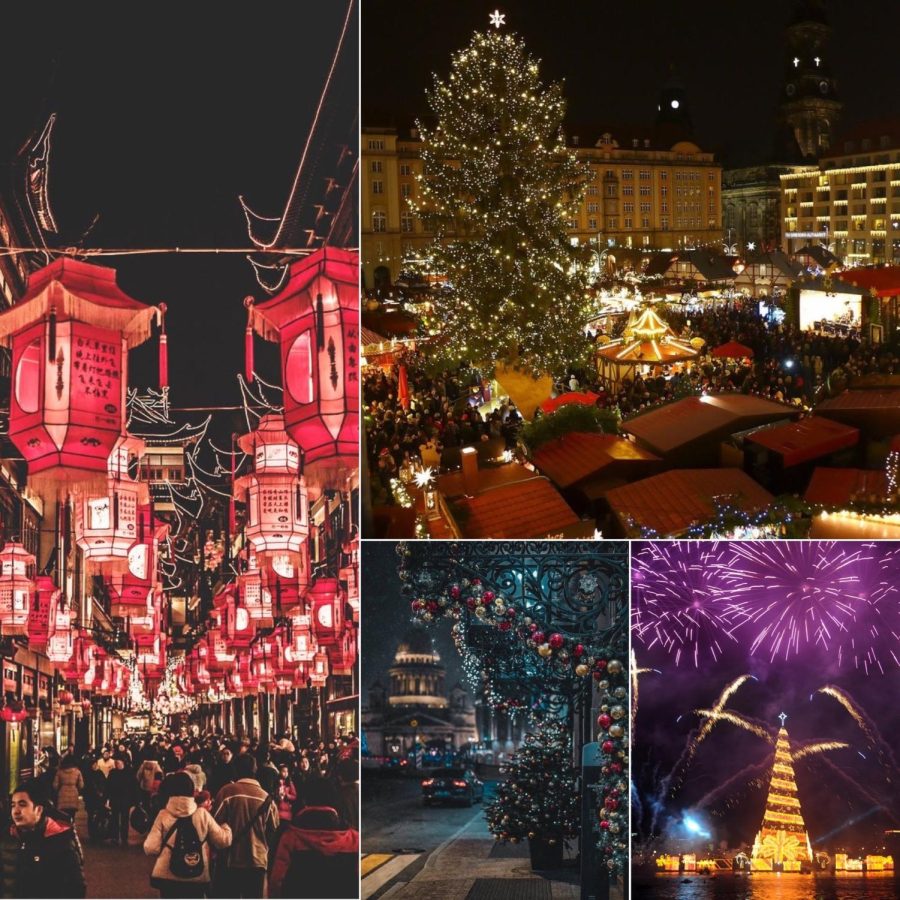The King’s Academy offers cultural diversity by offering an international student exchange program and accepting students from diverse cultural backgrounds and heritage. Every nation has its own customs, especially around the winter holidays. With the holidays just around the corner, this article highlights some of the customs and holiday spirit observed in several countries. Additionally, students share their own experiences from their native countries.
“In Hong Kong, we celebrate Chinese New Year as well as January 1st. Everyone gets at least 4-5 days off, including adults, and it is a thing to wear red clothing on the first day of the Chinese New Year. One of the customs involves people who are not yet married receiving something called “red packets,” which is an envelope with money in it, and people who are married giving out the red packets. On the 26th of December, we have “Boxing Day,” where we open all the gifts we got for Christmas. The winter solstice is a huge thing for us too, so we get a day off and gather with our family.” – Chanelle Cha, Hong Kong
Chinese New Year’s is the holiday that marks the start of a new year according to the ancient lunisolar and solar Chinese calendar. Tradition dictates that celebrations go from New Year’s Eve, the night before the first day of the year, until the Lantern Festival, which is observed on the fifteenth day of the year, to signify the end of winter and the start of spring. In accordance with various beliefs and traditions, the first day of the Chinese New Year begins on the new moon that occurs between January 21 and February 20 celebrations go from New Year’s Eve, the night before the first day of the year, until the Lantern Festival, which is observed on the fifteenth day of the year, to signify the end of winter and the start of spring. In accordance with various beliefs and traditions, the first day of the Chinese New Year begins on the new moon that occurs between January 21 and February 20. The festival is traditionally a time to honor deities and ancestors and reunite with family.
“In Brazil, Christmas, as well as the New Year, are primarily about family. We gather to celebrate and remember warm memories from years past. Both celebrations are commonly spent in a family circle, and many celebrate them regardless of their faith. We have a tradition that when you are about to go into the sea and manage to jump seven times over a wave, you will get a lucky year. Since it is summer in Brazil during the Christmas season, outdoor activities and barbeques are highly popular. ” – Luana Kreuz Grunitzhy
Popular food involves turkey and traditional Brazilian sides: beans, rice, farofa, couve, and fruits. Rabana, the Brazilian version of French toast, is a popular dessert and a Christmas tradition. It may be expensive and time-consuming to gather such a vast number of individuals for gift-giving, thus many Brazilians opt for “Amigo Secreto or Amigo Oculto” instead. It is similar to Secret Santa in that one individual is assigned the task of buying a present for another person while keeping their identity a secret. Everyone makes a guess as to who it is before the exchange starts before handing them the gift.
“In Honduras, they celebrate Christmas on the eve (Also known as Noche Buena) and Christmas day is the day of rest. Unlike America, Christmas celebrations take place on the 24th of December in Honduras. People gather and they eat nacatamales, roasted chicken, pork, and more. After the gift exchange, they celebrate with fireworks. Then, at midnight it is time to eat the main Christmas meal, tamales. For Christmas, they usually have a large dinner, and December 25th is a day of rest.” – Gianna Pena, American, Honduran heritage.
Christmas trees are becoming increasingly common, but most homes also feature a nativity scene, or “Nacimiento”, which is seen as a significant tradition. While some individuals may exchange gifts on December 24 and 25, many kids eagerly anticipate receiving gifts from The Three Kings on January 5 and Epiphany Eve. There are street parades of individuals costumed as the Kings on Epiphany, commonly known as Three Kings Day.
“In Germany, we celebrate on the 24th. We often take a big walk with the family before church, attend church in the afternoon, then come back to find the presents under the Christmas tree. Eating is torture because we just want to unpack our presents. After, we discuss everything and eat. When I was younger, on St Martin’s Day I participated in a tradition called “Laternelaufen.” It involves a walk with lanterns and singing traditional Christmas songs. Winter holidays in my country are calm but involve fun activities.” – Milena Wetterauer, Germany
According to the legend, Saint Martin, a Roman soldier, gave a beggar half of his red cloak to protect him during a snowstorm. Saint Martin is considered the protector saint of travelers and the poor and is seen as an example to children to share and be giving. Once the sun sets on November 11th, children across Germany, walk through the streets with magical, colorful lanterns and songs. Popular drinks and foods during the season include meals that feature duck, goose, rabbit, or a roast. There are celebrations connected with various Saints and figures from legends as a part of European legacy.
“In Ukraine, most celebrate Christmas on the 7th of January because the Orthodox is the major branch of the religion, although my family celebrates both Christmases. Both New Year and Christmas are often spent in a family circle, but also can be spent with friends. Unlike the U.S., hired actors may dress as Santa Claus and Snow Maiden (Santa’s Granddaughter and helper) visit houses and give the presents, although some households pretend that Santa came and left the present under the tree. There is always a big feast in during Christmas evening and New Year. We have a saying that how you spent your new year will be like how your full year goes, so it is significant to make positive memories. The primary purpose was to protect and enhance the family’s health, happiness, and harvest. Caroling is a common winter holiday tradition, along with sharing how the past year went, and traditional Ukrainian food. Christmas dinner is prepared by family members and made up of 12 dishes that represent the apostles. Caroling or “Koliada” is another Christmas tradition. Children and teenagers visit neighbors, relatives, and friends during Koliada, performing traditional songs and wishing the families well. In exchange, hosts offer Koliada participants gifts like candy, fruit, or cash.” – Diana Lytvyn, Ukraine
The warmth of family and friends, delicious food, along with the holiday spirit add up to make great memories for people all around the world. Holidays are often a symbol of hope and belief in the bright times being ahead, although also appreciating every memory of the past year.



